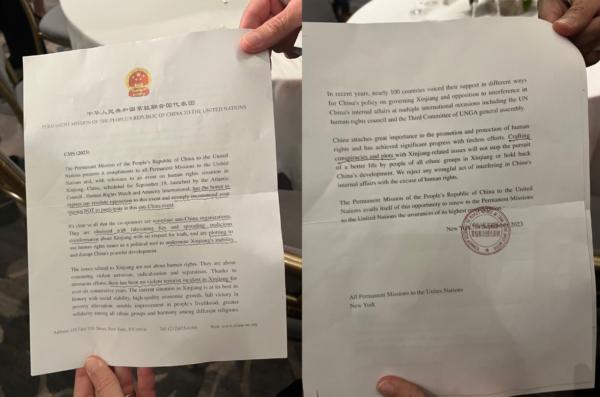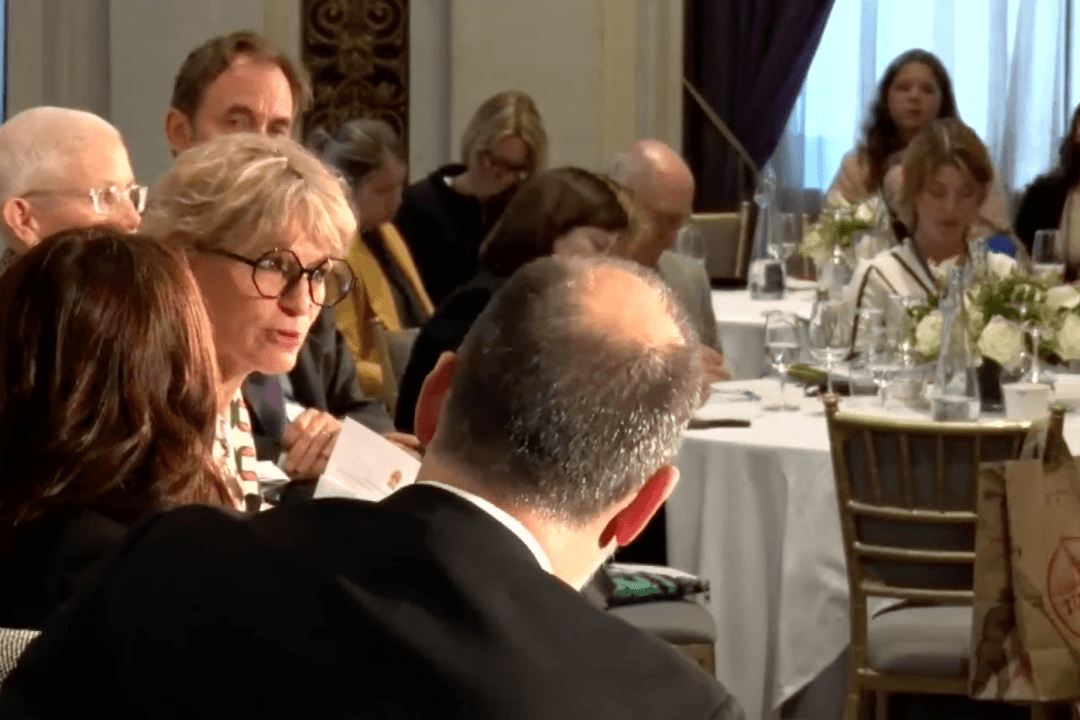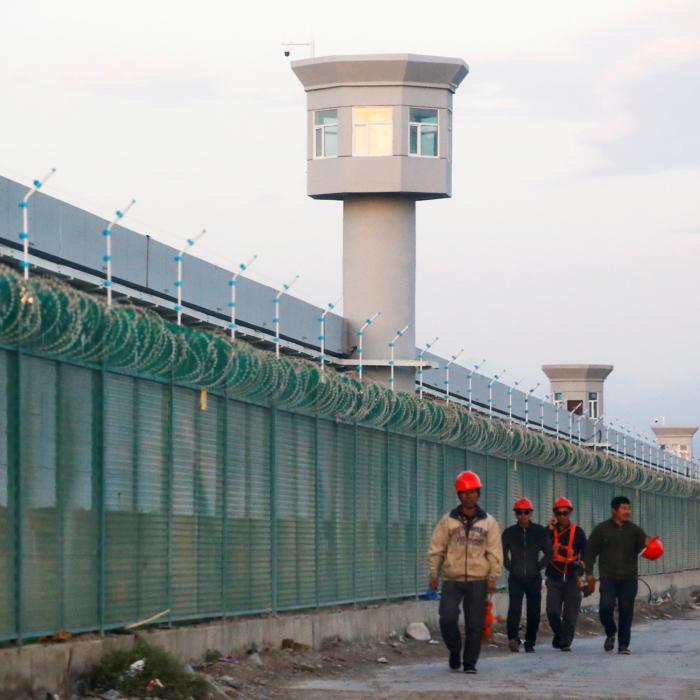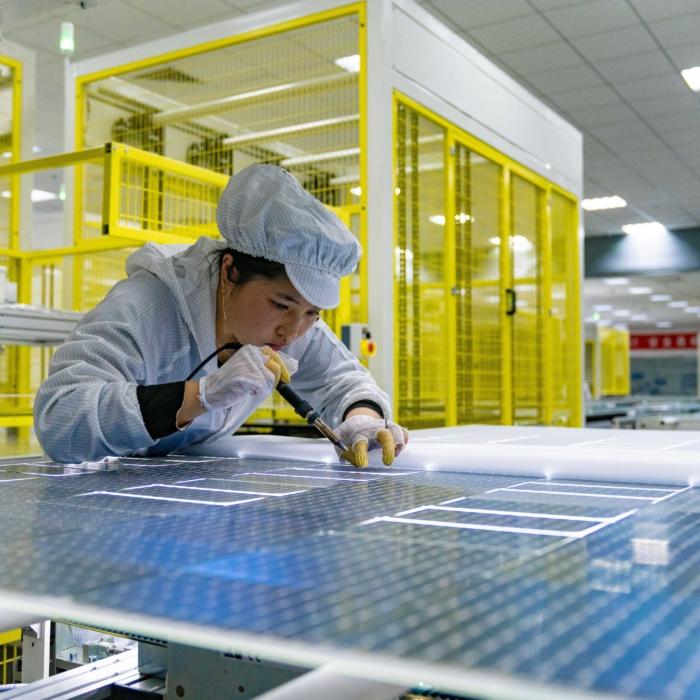NEW YORK—When international human rights leaders held a panel adjacent to the United Nations General Assembly to discuss the Chinese Communist Party’s (CCP) crimes against humanity in their treatment of Uyghurs and other minorities, they knew Beijing was taking note.
The weekend ahead of the Sept. 19 panel, the Permanent Mission of the People’s Republic of China to the U.N. sent a letter to potential attendees, blasting the event as “anti-China” slander and based on “conspiracies” and strongly recommending member states not attend.
“It’s essentially confirming that it’s got a lot to hide, and it knows it,” said Sophie Richardson, China director of Human Rights Watch, at the event.
“China really doesn’t like when the situation is talked about openly, publicly,” said Agnès Callamard, secretary general of Amnesty International.
The event, co-hosted by the Atlantic Council, Amnesty International, and Human Rights Watch, called on governments to do more to confront Beijing on its human rights abuses, pointing out that the CCP is hyperaware of its international image.

Xinjiang
The Xinjiang Uygur Autonomous Region is in the northwest of China, and is supposed to operate as an autonomous region. It’s home to 25 million people of a variety of ethnicities.The CCP arbitrarily detains citizens of the Xinjiang province in re-education and forced labor facilities, all under the guise of “anti-terror” or “anti-extremism” law enforcement. Reports of these abuses surfaced as early as 2016.
China, already a member of the United Nations Human Rights Council, issued a response nearly three times the length of the report, denying any wrongdoing. It dismissed the report as “anti-China” disinformation, and called on the council to instead investigate the “disasters” in Western countries.
Despite Beijing’s warnings, attendees of the panel event included representatives from the United States, the European Union, Germany, France, and The Netherlands.
Officials and human rights advocates repeatedly warned that one should “not be misled” by Beijing’s lip service and cosmetic concessions—that when they announce the closing of one concentration camp, they build another, more permanent detention facility.
U.S. Ambassador-at-Large for Global Criminal Justice Beth Van Schaack said the UN report should be taken as “just the beginning and not the end.” NGOs, academics, journalists, and citizens on the ground have reported an increase in CCP suppression, contrary to Beijing’s official statements, and the United States believes the reports are credible, she said.
In 2021, the Uyghur Forced Labor Prevention Act was enacted and $385 million in goods violating that law have since been denied entry into the country. Visa restrictions have also been imposed on CCP officials known to be involved in the violation of human rights.
European External Action Service Managing Director for Multilateral Affairs Belén Martinez Carbonell said new sustainability reporting regulations will have a human rights requirement as well, requiring EU companies to carry out due diligence into whether forced labor and other human rights abuses were involved in the manufacturing of their goods.
CCP Crimes Continue
Rayhan Asat, a human rights lawyer and senior fellow at the Atlantic Council, is of Uyghur descent, and shared that her brother had been illegally detained in 2016.“Some of the re-education camps have closed down, but the prison camps are expanding,” she said, referencing a report where China said it was building more camps with more permanency. She warned of CCP efforts to present a very different image of Xinjiang to diplomats and the international audience through social media, citing publicity campaign videos “forcing Uyghurs to sing for the camera.”
“Any individual with common decency and intelligence can see that they’re seeing what China wants them to see,” she said, urging visitors and viewers not to repeat the party line.
The panelists also warned that the CCP’s crimes are “transnational,” even taking place on foreign soil.
Ms. Asat pointed out that the CCP “makes sure that it’s not easy” to speak out, even outside of China.
“Americans living in America are still subject to China’s long-arm reach, and what they’re using is our families, our loved ones, their lives. They’re keeping them as a hostage,” she said. She’s heard from Uyghurs separated from their families who say they’ve been allowed to just hear a second of their voice on a phone call, so they know that they’re being watched by the CCP.
Jonathan Bass, a board member of Jewish World Watch, was a guest at the event and shared that on several occasions, Uyghurs his organization had worked with were subject to retaliation from the CCP.
“We sponsored the first two Uyghur women to testify to in the China Select Committee ... one of them, after she testified, her family was targeted in China and killed,” he said. Last year, Mr. Bass’s organization gave an award to someone of Uyghur descent in Los Angeles, “and the Chinese sent operatives to the event to photograph and monitor each person that attended the event.”
“They’re here, and they’re everywhere, and they do take action,” he said.
Ms. Callamard pointed out that countries are allowing the CCP to use their own police, agents, and even prisons on foreign soil and territory with no legal repercussions.
“No state thus far has taken action, legal action, in response to this kind of international crime,” she said. “What are governments doing against the fact that rule of law and so fundamentally part of their national essence is being violated by a foreign state on their own territory?”
“If they hold the line much more resolutely, effectively ... then maybe we have a chance,” she said.







